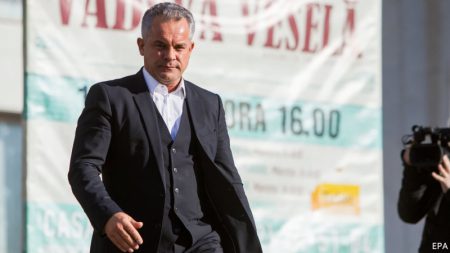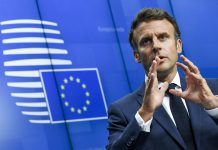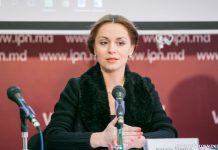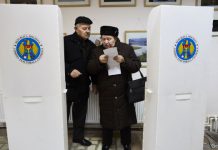IF RECENT events in Moldova, a tiny former Soviet republic, were used as the basis for a political-cum-gangster thriller, critics might find the storylines a bit far-fetched. In recent weeks, highlights of the drama have included the following episodes. President Igor Dodon, who has little power but wants his country to align its economy and foreign policy with Russia, refused for ten months to sign off on the appointment of a new minister of defence. The government, which claims to be pro-Western and in favour of co-operation with NATO, insisted on its choice. On October 24th, a new minister was sworn in only after the constitutional court suspended Mr Dodon from the presidency for just long enough for the new minister to be appointed.
The next day, prosecutors indicted seven men for conspiring to assassinate Vlad Plahotniuc (pictured), the head of the Democratic Party. He is a wealthy oligarch and, many believe, by far the most powerful man in the country. The chief conspirator is an alleged gangster known as “the Bulgarian”, who is believed to be in Russia. Mr Plahotniuc says he aims to anchor Moldova safely to the West.
Then on November 2nd, in a television interview, a jailed gangster alleged that Mr Plahotniuc had paid him to murder a Russian banker in London. A spokesman for the Democratic Party said that Mr Plahotniuc would not comment on “false statements”, but a television station he owns responded that it was another Moldovan politician, currently a fugitive from justice in Russia, who had in fact paid for the failed assassination attempt.
With all this going on, disillusion with the old pro-Western elite is high. In 2015 it emerged that $1bn, equivalent to one-eighth of the country’s GDP, had been stolen from three banks. Unless the cash is recovered, Moldovan taxpayers will have to foot the bill. In 2014 it had been revealed that Moldovan banks had laundered $20bn of Russian cash. In 2016 Vlad Filat, a former prime minister and Mr Plahotniuc’s great rival, was jailed for abuse of power. He claimed he had been framed. In the words of one diplomat, that has left Mr Plahotniuc as the “last man standing”.
In 2014 Mr Plahotniuc’s party won only 15.8% of the votes in the general election. However, directly or indirectly he is reckoned to control more than half the deputies in parliament, and hence the government. He is also said to exercise great influence over the judiciary, though he claims that this is an “invention” by his enemies. One diplomat says: “Let’s be clear, this is a captured state—captured by one guy. An oligarchic dictatorship. There is no interest in judicial reform in this country, because if there was, this regime would come tumbling down like a house of cards.” On October 11th the European Commission said it was suspending €28m of aid earmarked for judicial reform in Moldova, because the country was not reforming its justice system.
Mr Plahotniuc may be powerful but he is certainly not loved. According to a poll earlier this year he is trusted by only 2% of the population, though he protests that “there is still a need for me.” If elections were held now, only 4% would vote for his party. By contrast, President Dodon is trusted by 41%, and 36% would vote for his lot, the poll said.
Mr Dodon and Mr Plahotniuc say they stand for starkly differing visions of the future, but many believe that in fact the two are operating a political cartel. In July, for instance, they co-operated to pass a new electoral law which could benefit their parties while serving to keep others out of parliament. The law came in the wake of last year’s presidential election, in which Mr Dodon won with 52.1% of the vote against 47.9% for Maia Sandu, a popular former minister of education. She now says that her activists are being harried by the authorities. “This government has lost the trust of the EU and the US and they need to do a lot to regain it,” says Victoria Bucataru, the director of the Foreign Policy Association of Moldova, a think-tank.
Ms Sandu worries that Western countries are simply giving up on her country. She might well be right. Since so much money has gone astray while the allegedly pro-EU parties have been running the country, Vladimir Putin might have to do nothing but wait for Moldovans to conclude that Mr Dodon and his party are the right people to restore order—and see Moldova return to the Russian fold.







